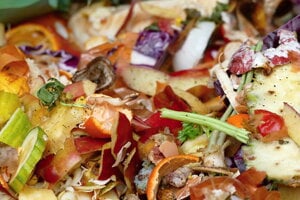Every year Slovakia produces 100 kg worth of wasted groceries per capita, which is about 0.27 kg a day.
The groceries that most often end up in the rubbish bin are bread and pastries, fruits and vegetables, dairy products, cooked leftovers, as well as unopened groceries, according to an analysis by Wood & Company analyst Eva Sadovská, as reported by the TASR newswire.
Hundreds down the drain
The analyst figures that the average Slovak throws out €100 to €150 worth of expired leftovers and groceries annually.
Biowaste is created not only in households but also in the production and transport of groceries, in restaurants, hotels, and parking lots. Sadovská stated that in the case of towns one of the most practical options for collecting biowaste is to use a bucket collection system.
In the case of apartment housing, brown collection bins with volumes ranging from 120 and 240 up to 660 litres can be used. They could be placed in the same collection areas as other rubbish bins.
New purpose for biowaste
There are plans to ensure that biowaste does not end up in landfills, but evaluated in biofuel stations or composting plants.
“The key fact is that thanks to waste sorting and conversion to compost or fuel, kitchen waste is becoming a resource, one of the pillars of the circular economy,” Sadovská pointed out.
 No more kitchen waste in trash bins. Municipalities have a new duty Read more
No more kitchen waste in trash bins. Municipalities have a new duty Read more The growth of costs connected with implementing and ensuring the sorting of kitchen waste and its subsequent processing was estimated by the analyst to be 10 percent.
“Increased expenses for cities and smaller municipalities will most likely be reflected in higher fees paid by residents for trash collection,” said Sadovská.
She added that the increase in collection costs will also depend on the extent to which local governing bodies will be able to request EU funds for the collection of biowaste.
Sadovská also mentioned that from January of 2021 municipalities are required to secure the separate collection of kitchen waste. In response to a request from local governments, the Environment Ministry announced a short transitory period. The period is set to end on July 1, 2021.






